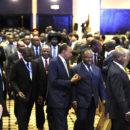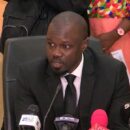Cameroon Elections 2011: opposition in limbo – By Ajong Mbapndah L
 At the dawn of the 1990s, so strong was the opposition to President Biya that there were few who would have bet he would survive as long as he has. His supporters may credit this to “˜political astuteness,’ but he has also been a very lucky leader – benefitting from an opposition which has failed to get its act together.
At the dawn of the 1990s, so strong was the opposition to President Biya that there were few who would have bet he would survive as long as he has. His supporters may credit this to “˜political astuteness,’ but he has also been a very lucky leader – benefitting from an opposition which has failed to get its act together.
By Ajong Mbapndah L
The National Coordination of opposition parties held sway over the population in the early 90s.Public rallies were hugely attended. Its actions, like the operation ghost towns, were strictly respected (to the point where the economy came to the brink of paralysis.) A leader of one of these parties, who met with President in the height of opposition to his leadership in 1991, told this writer how Mr Biya paid less attention to his proposals on how to move the country forward, in preference of finding out what really made his then nemesis John Fru Ndi tick and why Cameroonians were flocking to him.
In the Presidential elections of October 1992, President Biya was proclaimed winner by slima margin of two points from John Fru Ndi of the SDF and the Union for Change Coalition. The combined scores of the three leading opposition candidates – John Fru Ndi, Ndam Njoya (Cameroon Democratic Union), and Bello Bouba Maigari (National Union for Democracy and Change) outweighed those of President Biya. A consensus candidate presented by the opposition would likely have beaten Biya. Prior to the Presidential elections, the March 2011 parliamentary elections failed to give the CPDM an absolute majority. Instead of the opposition coming together to use their strength to push through a reform agenda from parliament, two of the opposition parties threw their weight behind the CPDM so it could get a badly needed majority.
In 2007, the leading opposition parties came up with the marketable slogan of “˜No Good Laws, No Elections.’ This culminated in the decision of the top three political leaders John Fru Ndi, Ndam Njoya and Bouba Bello to opt for an election boycott. Many argued that a united front to challenge the incumbent would have been a more effective response. It has been argued that difficulties in selecting a consensus candidate facilitated the decision to call for a boycott. After President Biya was proclaimed winner, reports surfaced that the very opposition parties which boycotted elections negotiated modalities with him to join the government. Bello Bouba of the UNDP eventually joined the government.
In 2004, the opposition did put in place a coalition to challenge Biya. Led by Fru Ndi and Ndam Njoya, the group which included current Minister of Communication Issa Tchiroma embarked on a tour of the ten provinces. A program was put in place and many thought that 2004 might have been the year when the opposition finally sent Biya packing. The people were however again left disappointed as the coalition fell apart following disagreements on the choice of candidate. In the face of a divided opposition Biya found no need to labour himself with any intensive campaigns, and was proclaimed winner with a landslide.
Such is the opposition in Cameroon – one that is faced with multiple crises, chief amongst them a crisis of credibility. The Social Democratic Front, just like its leader John Fru Ndi, is a pale shadow of what it was in the 1990s. Dictatorial tendencies have purged the party of most of its brilliant cadres. Indeed, most of the parties and their leaders are guilty of exactly the same vices that they accuse Paul Biya and the CPDM of. It speaks volumes that since 1990 the bulk of opposition parties still have the same people at the helm, yet they accuse Biya of eternalizing himself in power. It does not augur well when political leaders want Biya to declare his assets and yet cannot declare their own.
Why should Biya hurry to respond to calls from the opposition for the creation of an independent electoral commission when calls for the creation of similar structures to guide elections within the opposition ranks have resulted in the scapegoating of those who dare support such ideas?
The opposition bears its fair share of responsibility in the stunted evolution of the democratisation process in Cameroon. Cameroonians have substantially lost faith in the electoral process, but also harbour a justifiable mistrust of the political actors from both the ruling party and the CPDM. Just as Mr. Biya has failed to expressly declare his candidacy for the elections, so too has Mr. John Fru Ndi of the SDF who emerged runner up in 2004.
A curious development is the multiple number of candidates from the English speaking part of the country (Southern Cameroons) who have expressed the interest in the race for Unity Palace. Kah Walla, Hon Ayah Paul, Barrister Bernard Muna are amongst them. No English speaker from the Southern Cameroons has ever served as President. Hon Ayah – a no nonsense judge prior to joining Parliament on the ticket of the ruling party – is on record as the lone member of the CPDM who went rogue in opposition to the controversial constitutional amendment of 1998 that terminated term limits. He is also one of the few politicians who has declared his assets. He recently resigned from the CPDM. Ben Muna – the son of the former Speaker of the National Assembly – used his tenure as the President of the Cameroon Bar Association to militate for human rights and democracy in the country.
Still to make official his intention is Dr Christopher Fomunyoh Senior Associate and Regional Director for Central and West Africa at the National Democratic Institute. There have been calls for him to contest the elections and the fact that he has elected domicile in Cameroon for about a year now may not be unconnected to the political challenges of the time. Interviewed last year by this writer, Dr Fomunyoh amply summed up what Cameroon needs in 2011 ” a fresh face untainted by the fatigue and scandals of the ruling party or the fragmented politics of the opposition.”
On the surface, 2011 may appear a fait accompli for Biya. The odds favour him, low voters registration, an electoral commission not only void of powers but full of well known ruling party cadres, the military at his beck and call, a disoriented opposition et al. However, the uncertainties are many, and the need for change may be stronger than Cameroonians have so far manifested.
Parliament is in an extraordinary session to deliberate, amongst other things, a law to give Cameroonians in the diaspora the right to vote. It may be naí¯ve to hope on this but what if President Biya decides to burnish his porous legacy with elections which reflect the will of the people? In a conversation with a respectable Zimbabwean intellectual who listened calmly as I made a critique of the leadership of Biya, his response stunned me, “is the problem Biya or Cameroonians?” The answer could help piece up the 2011 puzzle.
Ajong Mbapndah L is Managing Editor of Pan African Visions






